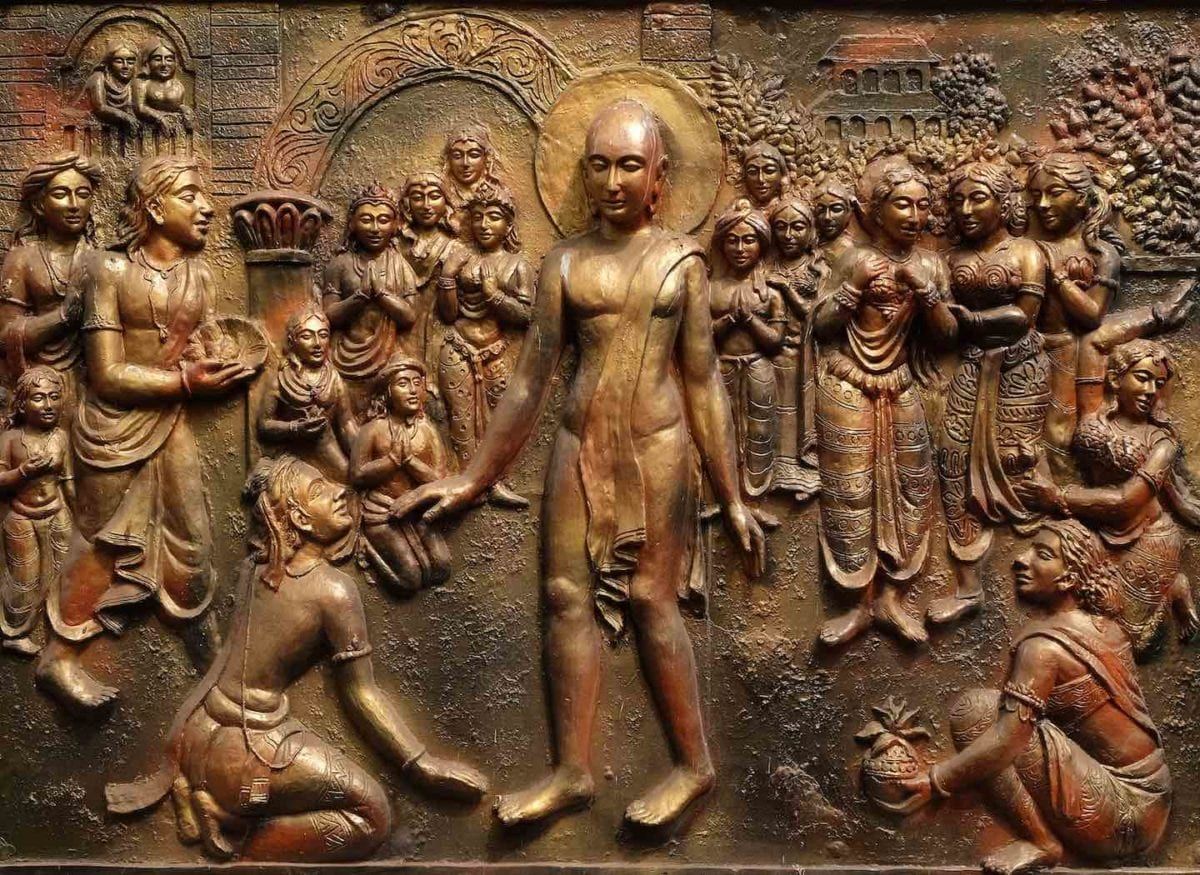Bhagavan Mahavira (540 – 468 BCE) was passing through a village in the kingdom of Magadha (present-day Bihar) with many doting initiates in tow. His ganadharas 1 followed their master with such extraordinary devotion and surrender that it baffled everyone unfamiliar with Mahavira’s teachings.
Giving him epithets like Bhagavan,2 Vardhaman,3 and Sramana (devoid of love and hate) among others, his word was their nirvana.
When Mahavira realized the nature of reality, to show his abandon and indifference towards the social customs, he dropped his clothes and wandered digambara, sky-clad; his devotees followed suit. It was not just courageous or bold but downright rebellious. For, even now, we shame nudity, we equate it with obscenity and disgrace.
The chief sign of our social etiquette and moral character borders around how private we keep all acts we do when we are naked — from bathing to breeding and everything in between. You are judged in society almost exclusively not on how you actually are but on how well you cover your tracks. We don’t celebrate nudity, if anything, we dress our bodies to appear honorable. To cover is to be civil is the universal belief.
Mahavira, however, rejected it completely. 4 Our civility is in our moral values, he said.
It is, therefore, no surprise that he commanded peerless deference and love from his disciples, that they called him Bhagavan.
For, not only did Mahavira take compassion to extreme lengths (covering your mouth, so you don’t accidentally eat and kill small organisms while breathing; not eating roots for such food belongs to the creatures born underground; sweeping before you move, so you don’t step on any living entity; not eating after sunset, so you won’t kill nocturnal insects who might rush to the fire; walking barefoot, so no animal is killed to make your shoes and you are more mindful of what you are stepping on and so on), he also proclaimed that there’s no one way to realize or approach the truth.
In fact, the discovery of truth was an individual matter and depended upon one’s conditioning. To that effect, he propounded the doctrine of anekantavada, a multi-sided reality or a multi-dimensional truth.
Like in a kaleidoscope, how you see the truth depends on how you see it, if you see what I mean.
Shunning all social customs, he took men, women, young, old, mendicants and householders under his wing and had a colossal following.
Presently, as Mahavira meandered through the village and reached the outskirts, he saw a distraught woman wailing. She was emaciated, her hair rough and unkempt, her saree torn, her body soiled and her hands grimy. His chief disciples tried to form a queue around him so he wouldn’t have to see the unpleasant sight of that woman. Who knows if she was just homeless or mad or both. But, this ploy failed before the ever alert and mindful sage.
He stopped walking, looked to his right where the lady had been sitting, now hidden by a long and full line of monks and nuns, and said to Akampita, one of his foremost disciples, “Make way. Mahavira would like to see her.”
“Indeed, Bhagavan,” Akampita replied, stepping to the side. “However, forgive my audacity for saying this but if Bhagavan continued with his journey that would be better. We’ll make sure someone speaks to that woman and provides what she needs.”
“It’s not befitting of the lord to approach that lady,” Agnibhuti, another disciple holding Mahavira’s parasol, spoke softly, “she has been shunned and deemed an outcast by the elders of the village.”
Mahavira peered into Agnibhuti and Akampita’s eyes without whispering another word. They immediately understood that their master had made up his mind. Without a moment’s delay, the disciples parted and the awakened sage walked to the lady.
“O Niranjani,” Mahavira said to her, “what is the cause of your grief?”
“You called me Niranjani,5 O Sage!” the woman said, sobbing. “I am the most unfortunate person alive, every inch of my karma is tainted.”
“Mahavira will deliver you,” he spoke compassionately with conviction. “What aggrieves you?”
“You are Mahavira!” Her eyes lit up. “The awakened one who is called Vardhman? Please cast a merciful glance on me and wash away my sins. I do not wish to live anymore. I lost my husband and only son to a house fire last month. I’m widowed, homeless, and childless now. Nothing can make me happy.”
Meanwhile, the disciples had arranged their master’s seat and they requested him to sit. Agnibhuti continued holding the parasol. Mauryaputra placed a small bench next to Mahavira and put his water-pot on it while Aryavyakta gently fanned him with peacock feathers and Akampita stood alert in attendance. The large crowd behind him, stopped dead in their tracks and maintained pindrop silence. Mahavira offered the woman water from his pot.
“What is your present age?” he said to the lady.
“I am 24 years old, Bhagavan.”
“When did you marry?”
“At fifteen.”
“How old were you when you had your son?”
“Seventeen.”
“Think back and tell me if you were happy before your marriage.”
“I had a wonderful childhood and a very loving father.”
“So, you were happy before you got married and had a child?”
“Yes, Bhagavan.”
“What has changed then?”
“I’m sorry, Lord, but I am unsure of the meaning of your words.”
“You were happy before you had your husband and son, and once again, they are no longer in your life. It’s the same situation as it was when you were fifteen. What is stopping you now from being happy again? The loss of your husband and son is not the cause of your grief. It is your attachment to the joys of the family and your memories with them.”
“But, O Vardhaman,” she contended, “at fifteen I had my father.”
“Only that you did not between the ages of 15 and 24 and yet you were happy. Earlier, you were happy because your father was in your life and later due to your husband and son. You have mistaken them for the cause of your happiness when, in fact, they were merely the source. You alone are the cause of your happiness. The sources of happiness are transient and temporary.”
“I seek your refuge, O Sramana,” she said, and urged Mahavira to initiate her.
An unsuccessful quest for happiness arises from one’s inability to segregate the cause of happiness from the source of it. The cause is always us. When we forget this we look outside at objects and people to bring happiness in our lives. We dwell on our memories, we long for pleasures and whatnot, as if to say, let’s at least have the source if I can’t find the cause.
In dealing with your loss, the greatest affirmation you can give to yourself is the knowledge that you were okay before you had what you may have lost today. And, if you remain open to the possibilities, you’ll be okay after a while too. If you don’t brood your way to the future, you will be surprised at how quickly life can take a pleasant turn.
avyaktadini bhutani vyakta-madhyani bharata avyakta-nidhanany eva tatra ka paridevana.6 All those in your life today were not there earlier and they won't be there in times to come. For a small span (of a few decades), they have shown up. What's there to lament? (Quoted it here too.)
Maybe you didn’t deserve to lose what you have lost. Granted, you probably stepped into someone else’s karmic field. Perhaps, you had bought a first-class ticket to be delighted in the pristine alps of Switzerland but ended up choking in the smog in New Delhi with paddy stubble burning all around you. Tough luck. Bad. I agree. It’s terrible. But, it’s happened already. Now what?
The place you aspire to be in, you alone have to build it. As they say: wherever you go, there you are. (Your luggage is a different story).
A religious man stayed with a family on a farmhouse and gave sermons every day for one full month. It felt that even the farm animals listened to him in rapt attention.
And sure enough, much to everyone’s surprise, on the last day, a plump and cute piggy approached the holy man and said, “Will I also go to heaven if I pray to God?”
“Without a doubt,” he replied, “the eternal joys of heaven await anyone who surrenders to the Divine Will.”
The piglet sauntered back to the barn all happy and warm inside.
A few minutes later, the young son of the farmer came to say goodbye to the preacher and said, “Please tell me the truth. Is heaven really the place where one can have whatever one wants?”
Absolutely,” the holy man said while packing his last bag.
“And, I can play video games all day, have fun and eat whatever I like,” the boy asked.
“Of course!”
“You mean, I can even get a hamburger there?”
“Son, let me tell you,” the preacher said with great enthusiasm, “you get the most delicious bacon in heaven.”
(Some nervous movement in the barn…)
The piglet or the boy, the truth is that there is only one heaven where unimpeded bliss flows and that is our own mind. Like clothes cover our body, the sheaths of ego, anger and conditioning cloak the beauty and bliss we carry within. The Upanishads called them avarana, covers.
Veils of ignorance, covetousness, vanity, hate, fear, shame, jealousy and so on. Somewhere, Mahavira had probably figured that the path to try and fit into the mold of this world would not lead one to their truth. And so he chose to shed his inner and outer covers. For the one who has dropped it all, has nothing to lose. And, that is a great starting point. Your loss gives you the chance to start anew; grab the opportunity with both hands.
Before it all comes to a screeching halt, the train of life will stop at many stations, there will be delays, even detours, the weather will not always be on your side, the co-passengers may be unruly, even the very rails of the track never unite beyond a few moments at the junctions, and no matter how nice a station, the train can’t stop there forever. It must move on.
This is the wisdom of life: to move along. Or else you run the risk of becoming rigid and closed. Stagnation is the opposite of evolution, spiritual or any other. Loosen up and walk away from your loss if you wish to make your journey worthwhile.
What’s there to lose anyway? There was a time when you didn’t have it, so what if it’s not there now. How come it’s your loss? You are where you were. Mahavira would have said something like that. I concur.
Peace.
Swami
Course
Art of Meditation
Free yourself from suffering and live life to the fullest. Learn the yogic technique of meditation in 4 days (and master it over a lifetime)
Here is a little guide containing nine truths of life. When adopted, these truths will help you make better choices in life. Go on, start with one and see for yourself how your life changes for the good(these truths of life can be adopted individually, irrespective of the order).
1st Truth Of Life: If you let them be, negative thoughts are like bubbles that rise to the brim and disappear. How to deal with negative thoughts?
A controlled physical response is the easy bit. It requires awareness and fortitude. If someone yells at you, with your own mindfulness you can remind yourself not to shout back, for instance. Easy. Well, almost. What to do though when it is not about some action but emotion?
How to get over the mental doom and gloom that engulfs you especially if you held back in the aforesaid situation? What to do when someone’s negative opinion about you bothers you, their thoughtless statement causes you grief, their misconduct makes you feel bad? How to be at peace?
Read more here.
2nd Truth Of Life: Are Gods and Demons real?
The demon within you impels you to do evil, and the god in you prompts you to do good. They are not two separate entities. They are simply two aspects of the same mind, like two sides of the same coin. Next time you find yourself getting angry when you find yourself getting lured to do the wrong thing, remind yourself that the god in you is losing the battle to the demon. That reminder that awareness immediately weakens the demon.
Meditationally speaking, gods and demons draw their power from the same source — your mind, it is a shared resource. So, if you strengthen your positive side, the negative one wanes automatically.
Read more here.
3rd Truth Of Life: Death is inevitable. How to deal with the loss of a loved one?
First and foremost, I want you to know that you will never be able to forget them. Any efforts you specifically direct at forgetting them will only make you miss them a great deal more. This is the harsh truth. And why should you forget them? Would you like to be forgotten when you are gone? When you begin to understand and accept the fact that the departed one has a permanent place in your heart, in your memory, in your life, a subtle healing begins.
Do not force yourself to erase them from your memories, to exclude them, just let it be for a while, let Nature take its own course, let it settle. Bereavement heals one over time.
Learn more here.on the two key elements of grief, namely, shock and denial.
4th Truth Of Life: Dragging my feet from one day to the next, what am I really doing? What is the secret to long-lasting happiness in life?
There are three ways to find meaning in your life:
Goodness
Service
Suffering
Our intrinsic nature propels us to discover our life’s meaning. When it comes to an inquisitive mind, discovery of meaning is the secret of happiness. You know, how there’s a release of energy and you laugh as soon as you understand a joke. So it is with life. You are set free the moment you get a grip on its meaning. Different things mean differently to different people. It’s a personal affair. Read more here.
5th Truth Of Life: What is the purpose of my life?
Don’t wait for your purpose to approach you. Purpose is not a debt-collector or a credit card offer to come to you uninvited. It’s more like a Nobel prize. You have to earn your purpose. Work for it, be ready for it. To learn how in the autistic Sandesh, Sunil found his purpose whereas the shopkeeper perceived him as a nuisance.
Read more here.
6th Truth Of Life: This person contended that while he made a lot of money and so on, he wasn’t living his ideal life. He did everything because he had to. “If not for my responsibilities,” he said, “I could be wearing a robe like you and roaming around freely.” What is the secret to leading a fulfilling life?
It’s so innate in us that I wonder if it’s hardwired in our brains. Many among us feel that the current life is not the best kind, that we are working towards something else, some moment after which we won’t have to do things we don’t like. The day we reach that shore, life will be all sunshine and rainbows and we’ll spend every second of our time doing things we fancy, love or dream of.
As if happiness and fulfillment is a certain stage where we’ll only be surrounded by people who love us and whom we love, when there’ll only be abundance, no stress, conflict or diseases, only joy and bliss, only peace and happiness. Some say that’s enlightenment.
If you ask me, that’s not just a far-fetched idea but downright ignorant and preposterous too. I am not sure how we arrived at the conclusion that liberation means freedom from work in our daily lives or zero-resistance in the pursuit of our dreams. Read more here.
7th Truth Of Life: “My wife and I are totally incompatible. Though I want a happy marriage, we argue over pretty much everything. I don’t know how to save my marriage.” - Is there a secret to a happy marriage?
It happens much too often, at least, I hear about it all the time, that two people even though married to each other for a long time, feel they are not compatible. She doesn’t listen to me, he doesn’t understand me, she doesn’t like any of the things I like, he doesn’t do any work around the house, our tastes don’t match, we are diametrically opposite in how we see the world or what we want from our lives and so on.
Read more here.to learn what makes a happy marriage.
8th Truth Of Life: Why do bad things happen to good people? Is this what we call Karma, if so what is the law of karma?
The law of attraction and the law of karma may well operate in tandem, but it is possible for one to do bad karma yet still excel at attracting good things. The reverse is also true — one may be a wonderful person and may still attract terrible things in life. Good or bad, that does not absolve him off his karmic debt, it does not get written off. It is dealt with separately by Nature. It is for this reason that sometimes who you may call bad, they continue to flourish till their last breath. They can attract the desired things in life.
Read more here.
9th Truth Of Life: How come certain people acquire and champion new habits almost effortlessly where many others fail terribly? How to be successful at building new, happy habits?
Let me share with you the three golden rules of building any new habit:
Practice
Patience
Focus
To build a new habit or to champion a new skill, somewhere, you have to want it desperately. More desperately than gaining others’ approval. Those who don’t have the same vision as you will disagree with you (sometimes with all the right intentions). There will be those who won’t believe in you, but if you are serious then all you have to do is to continue practicing patiently and mindfully.
Read more here.
Notes
A GOOD STORY
There were four members in a household. Everybody, Somebody, Anybody and Nobody. A bill was overdue. Everybody thought Somebody would do it. Anybody could have done it but Nobody did it.
Don't leave empty-handed, consider contributing.It's a good thing to do today.









Comments & Discussion
154 COMMENTS
Please login to read members' comments and participate in the discussion.